Rob Dorgan reflects on how quitting a PhD program helped him recognize burnout, redefine success, and build a more meaningful and balanced life.
Listen:
Check out all episodes on the My Favorite Mistake main page.
My guest for Episode #322 of the My Favorite Mistake podcast is Rob Dorgan, a multi-talented professional whose career path has taken him from paralegal to college professor, retail store owner, manufacturing company president, and now licensed massage therapist, certified yoga educator, meditation teacher, and astrologer. Rob is also the author of Awakening the Mystic: A Novel of Cosmic Love and Healing.
His favorite mistake? Taking what was meant to be a short trip to Europe while working on his PhD — a journey that led him to never return to that academic track. Instead, it opened his eyes to a different pace of life, sparked a reassessment of what success meant to him, and ultimately set him on a more balanced and meaningful career path.
In our conversation, Rob shares how that decision — which family and friends initially questioned — allowed him to escape burnout and embrace a life and career that integrates his passions for teaching, creativity, and well-being. He reflects on lessons learned from his “type A” years in academia and business, the importance of slowing down, and how yoga, meditation, and practical stress relief can improve both personal health and workplace culture. We also discuss his experience bringing these tools into corporate environments, where employees not only benefit individually but also feel more supported by their organizations.
“Stress comes on so slowly that it becomes your normal — and you forget what life without it feels like.”
That realization, Rob says, is what helped him see the deeper value of meditation and mindful living. We also talk about his book’s concepts — from the “five kleshas” in yoga philosophy to the idea of an “inner council” — and how self-awareness can help us navigate life’s choices. Whether you’re navigating a career change, seeking better work-life balance, or simply curious about practical ways to reduce stress, Rob’s story offers valuable insights and inspiration.
Questions and Topics:
- What’s your favorite mistake?
- How did your trip to Europe during your PhD studies change your career path?
- Did you consider moving to Europe to teach in that more relaxed environment?
- What countries did you visit on that trip?
- How did you go from teaching to starting a retail store and then leading a manufacturing company?
- Did yoga and meditation help you become a better leader?
- How did your personal stress experiences influence how you led the company?
- How have attitudes toward workplace stress changed since the 1990s?
- How do you make meditation and stress relief practical for corporate settings?
- How do companies usually find and bring you in for corporate sessions?
- What types of people attend your retreats, and what do they take away?
- How did you personally discover the benefits of a consistent yoga practice?
- How can yoga and meditation help with stress-related physical issues?
- What are the “five kleshas” in yoga philosophy?
- How do those concepts connect to ego, attachment, and fear?
- What is the “inner council” in your book, and how does it work?
- How did your interest in astrology begin?
- How can knowing your “council leader” help you in life and work?
- How did you balance the drive to finish your book with avoiding stress?
- What’s your advice for building habits like meditation or yoga into daily life?
Scroll down to find:
- Video version of the episode
- How to subscribe
- Quotes
- Full transcript
Find Rob on social media:
Video of the Episode:
Quotes:
Click on an image for a larger view
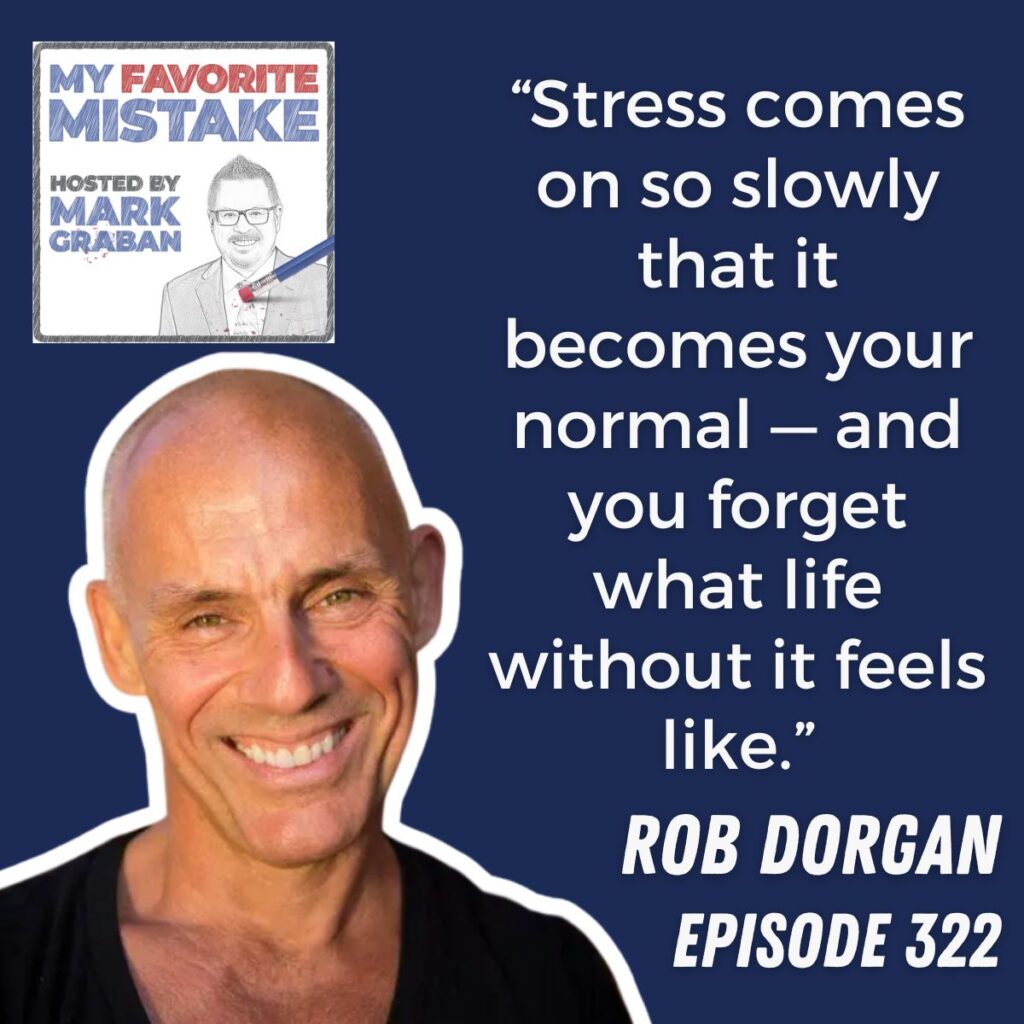
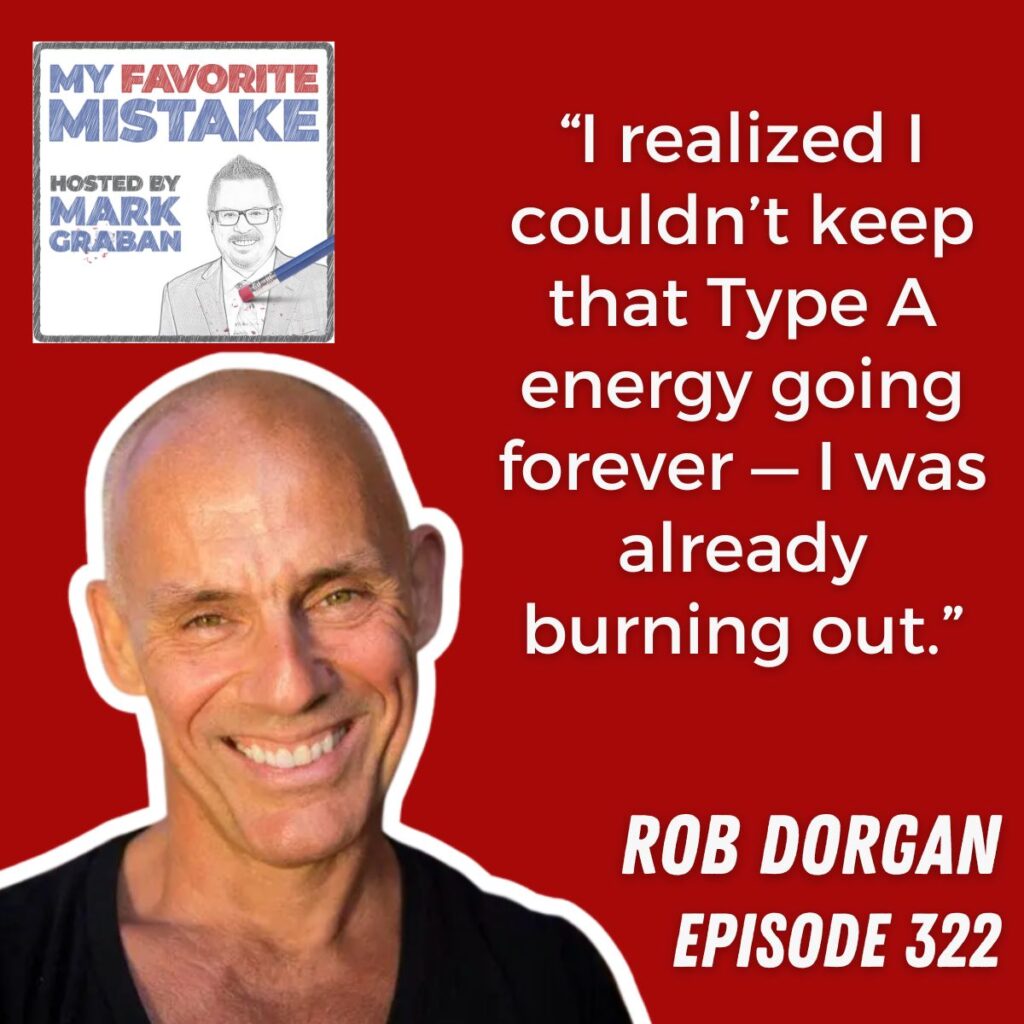
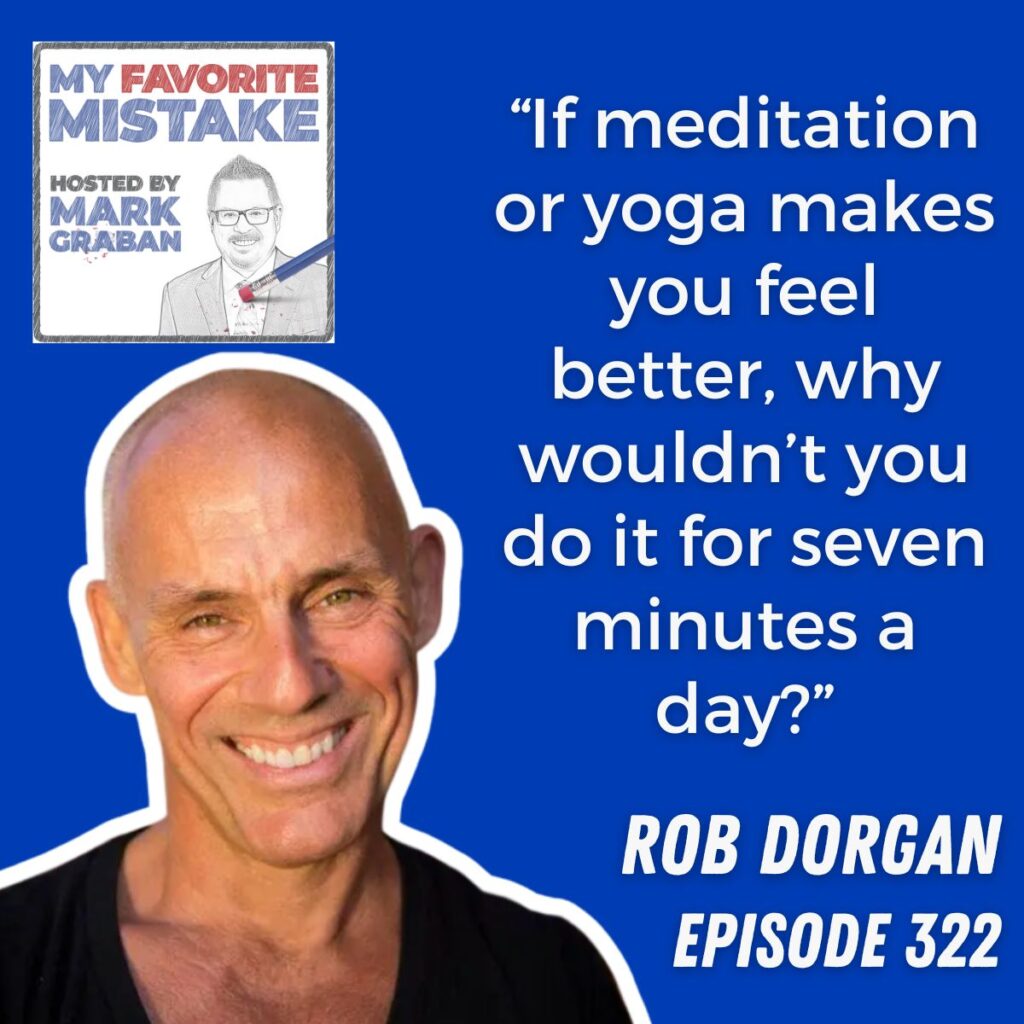
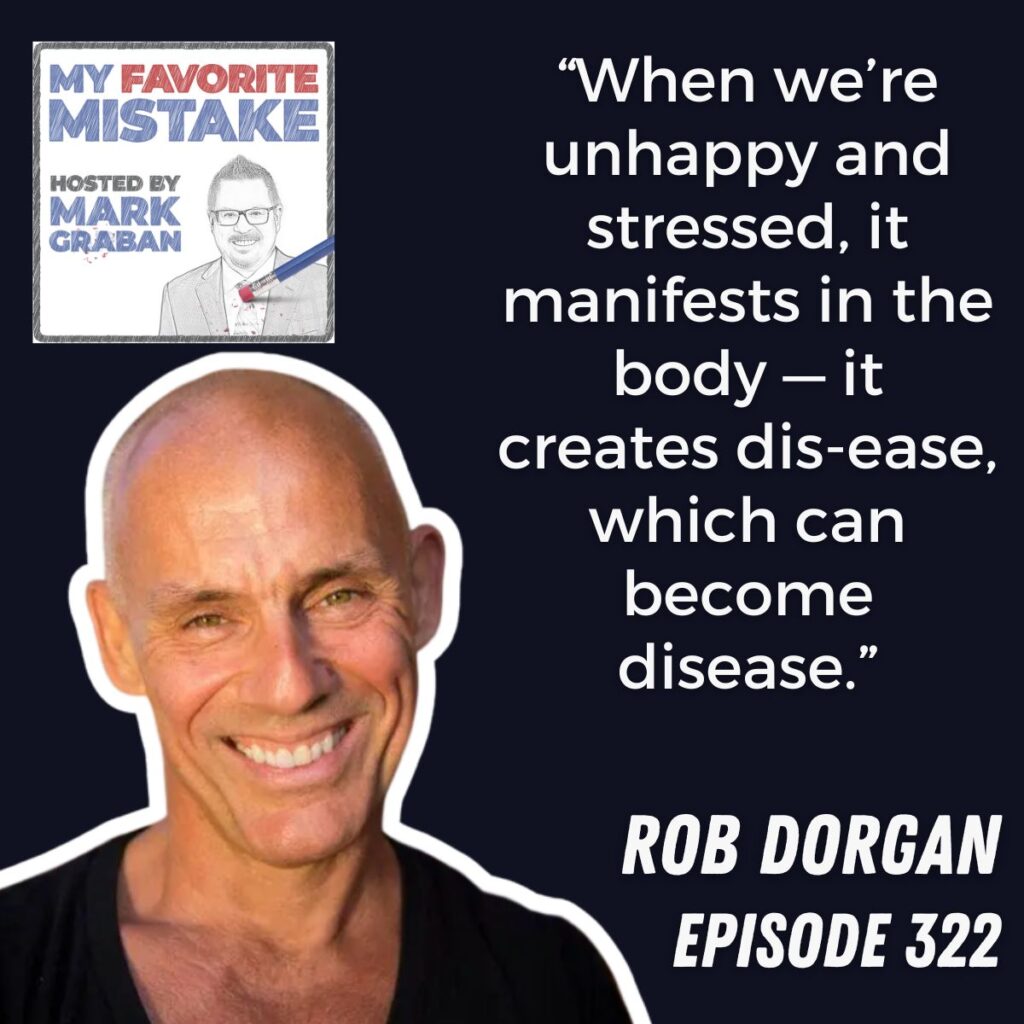
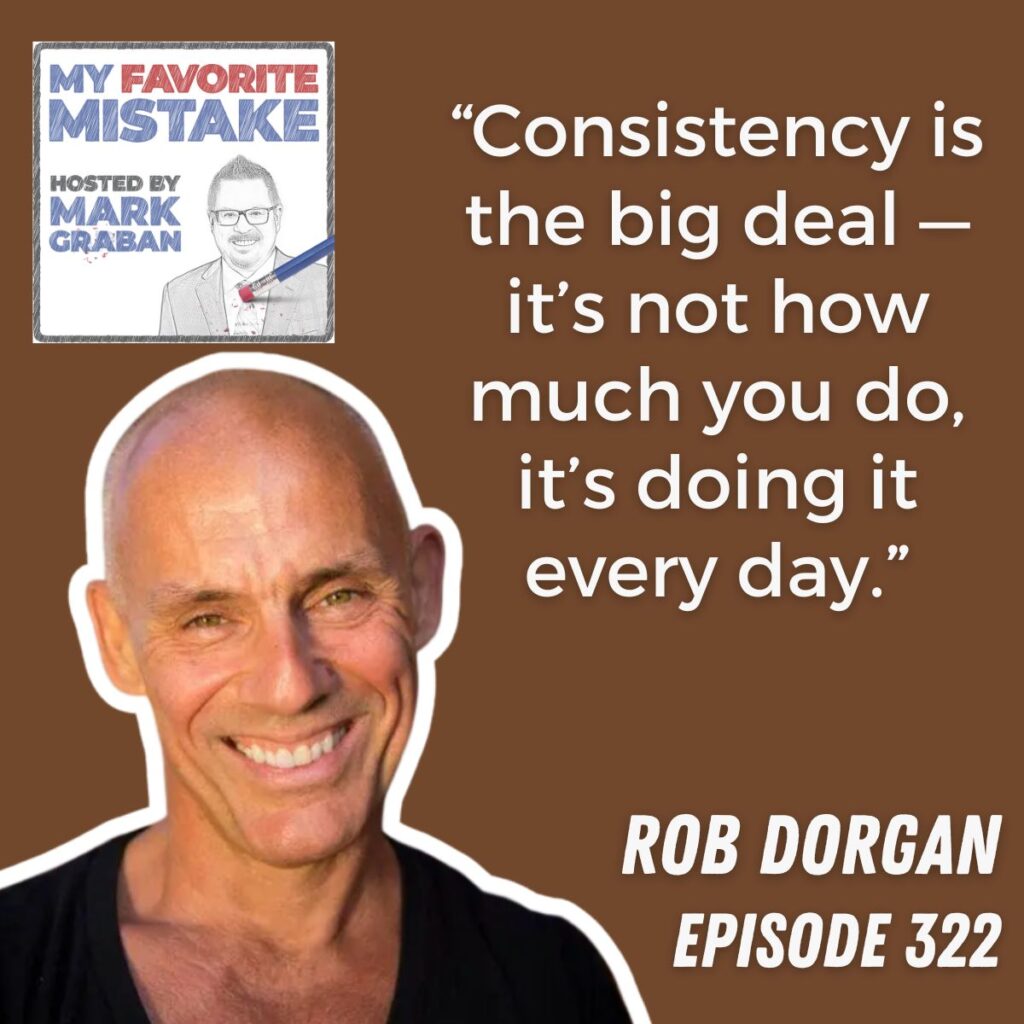
Subscribe, Follow, Support, Rate, and Review!
Please follow, rate, and review via Apple Podcasts, Podchaser, or your favorite app—that helps others find this content, and you'll be sure to get future episodes as they are released.
Don't miss an episode! You can sign up to receive new episodes via email.
This podcast is part of the Lean Communicators network.

Other Ways to Subscribe or Follow — Apps & Email
Automated Transcript (May Contain Mistakes)
Mark Graban:
Hi. Welcome to My Favorite Mistake. I'm your host, Mark Graban. Our guest today is Rob Dorgan. He's had many careers, and we were introduced by a mutual friend here in the Cincinnati area. Rob has worked as a paralegal, taught Western Civilization at the University of Cincinnati, started a retail store, and was president of a manufacturing company.
Nowadays, he wears many hats — he’s a licensed massage therapist, certified yoga educator, international retreat facilitator, meditation teacher and devotee, and a practicing astrologer. Rob is also the author of the book Awakening the Mystic: A Novel of Cosmic Love and Healing. People watching on YouTube can see the cover behind him.
So, Rob, welcome to the podcast. How are you?
Rob Dorgan:
Good, Mark. Thanks so much. I’m really glad to be here.
Mark Graban:
Yeah, it’s great to have you here. I think there’s a lot of things we’ll talk about — we’ll certainly talk about your book and other recent things. But to tee that up, I’m really curious… the main question we always start off with here: Rob, what’s your favorite mistake?
Rob Dorgan:
I love the question. When we first talked about it, I really had to think — I guess we all feel like we’ve made several mistakes in our life. But I think my favorite mistake, which might sound odd, was going to Europe while I was working on my PhD.
You might think, “How can that really be a mistake?” But it’s one of the things that propelled me forward into the life I’m in now. I was on a set track. One summer during my PhD program, a friend and I decided we’d take the summer and go to Europe.
I’d been studying Western Civilization, Western history, modern Europe — so I was excited to see all the things I’d been studying.
Mark Graban:
Right.
Rob Dorgan:
What I didn’t expect, hanging out with other academics and artists for those months, was to experience such a different lifestyle. Even back then, Europeans didn’t take things quite as seriously as Americans do — climbing that ladder wasn’t the only goal.
I was very intense at that point in my life. When I got there, I just relaxed with these people. They told me, “We have holidays, and we make sure we take them.” That really impacted how I started looking at my life and what I was doing.
In a way, it was my favorite mistake because it totally altered my life path.
Mark Graban:
I can see where the expectations of a trip like that would be different from the reality. Did it derail your PhD studies? Or did it take a while for the impact to hit?
Rob Dorgan:
No, it was pretty immediate. I never finished my PhD — I have a master’s degree. I was supposed to be there three months; I ended up staying four. Back then, with no cell phones, I could get away with calling the office at night and leaving messages for my professors: “I’m staying longer.”
When I came back, the motivation I’d had before was gone. That trip really did alter things. I basically stopped the PhD program. I thought it was a temporary leave of absence… but it became permanent.
I’d already been teaching with my master’s, and I could teach history with that credential, so I continued teaching. But it shifted how I thought about my life.
Before that, I’d had a bump in the road when I was a paralegal — I thought I was going to law school.
Mark Graban:
Was that before your PhD studies?
Rob Dorgan:
Yeah. I was set to work for a large law firm here — all I had to do was go to law school. But I wasn’t sure it was for me. A college professor said, “I’ve got a program at UC, studying history. You love history — why don’t you try it out?”
I didn’t know if it was a stepping stone or not, but I also loved teaching. That trip to Europe might have “derailed” my goal, but it altered it in really interesting ways. I realized I couldn’t keep that Type A energy going forever — I was already burning out.
Mark Graban:
Maybe that’s my Type A personality choosing a word like “derail.” I didn’t mean that negatively about your decision.
Rob Dorgan:
Oh, no. Believe me, the feedback I got from family was, “First you’re not going to law school, now you’re not going to finish your PhD?” They thought I had a bright future on a traditional path — lawyer or professor — but I changed my mind.
Mark Graban:
Did you give any consideration to moving to Europe and teaching there, in that more relaxed environment? I imagine the people you were around had finished their degrees and were enjoying that balance.
Rob Dorgan:
Good point. I tried hard to get there, but it wasn’t easy. My specialty wasn’t as needed in Europe as it was here, so I would have had to change directions again. I decided I needed a different path.
Since then, I’ve been back to Europe a lot — I try to go every year, even briefly. I’ve led several retreats there, especially in Ireland, which uses my master’s degree in English and Irish history.
Mark Graban:
What countries did you visit on that first trip? Were you backpacking all over?
Rob Dorgan:
Yeah — I did the typical thing back then with a Eurail Pass. Started in Greece, worked my way through Italy, then Switzerland, Austria, France, eventually ending up in Ireland and England. My concentration was modern European history, so that fit perfectly.
Mark Graban:
You came back, taught, and then — I’m curious about the progression from there to starting a retail store, and then becoming president of a manufacturing company.
Rob Dorgan:
From the late ’80s until the mid-to-late ’90s, I was on what I call a sabbatical. I studied yoga, astrology, and other interests. The retail store grew out of that — all my interests rolled together.
Then a friend started a manufacturing company. It was perfect — he was importing marble from Italy, and we were doing artwork on it. I could use my design background. I started as production manager, moved up to sales manager, then eventually became president.
It was still a Type A environment, but with an artistic feel. Funny thing is, in that company, I was the most structured, Type A person compared to my friend who owned it.
Mark Graban:
So it wasn’t like you were applying for random manufacturing jobs — this was tied into your interests.
Rob Dorgan:
Exactly. I probably wouldn’t have worked for another manufacturing company. I was also offering yoga classes to staff, and we’d do short meditations in morning meetings. I used what I’d learned on my sabbatical to run the company, and it worked well.
Mark Graban:
Did your own yoga and meditation practice help you be a better leader?
Rob Dorgan:
Absolutely. I’d played with meditation in the ’80s because I was high-strung — going to doctors for nervous tension, physical issues I didn’t realize were stress-related. Back then, we didn’t see as much information about how stress affects the body.
I drank too much coffee to get through the day, never relaxed. That trip to Europe changed that. I took what I’d learned into my corporate job.
That job was important to me — going back to a professional career kept me from feeling like I’d “missed out” by not trying it. I stayed 12 years. Of course there was stress at times, but I encouraged people to deal with it differently — and I practiced that myself.
Mark Graban:
I think these topics are much more accepted in the business world now — or maybe in American society in general.
Thinking back to my first job 30 years ago — in a poor-performing General Motors plant — it was a high-stress environment where leaders yelled and screamed. Their idea of stress relief was probably cigarettes during the day and alcohol at night.
That wasn’t uncommon in the ’90s. But I know manufacturing leaders today who are much more open to sharing emotions — not just anger — and to finding healthier ways to handle business pressures. Studies clearly connect workplace stress to physical health issues, not just heart attacks but a range of illnesses.
Rob Dorgan:
Exactly. And the tricky thing is, stress comes on so slowly that it becomes your normal — you forget what life without it feels like. You might think you’re handling a boss who yells all the time, but it’s still affecting you.
I think things are different now. Because of my background — master’s degree, company president — I can go into corporations and talk about stress relief in a way that’s practical.
I focus on making it accessible. If you get too esoteric, people shut down. But if you show them how to breathe deeply and build small habits to relax during the day, they see that it makes them more productive and creative.
Mark Graban:
You can even make a business case — creativity, innovation, problem-solving, and performance all improve when people aren’t constantly stressed.
Rob Dorgan:
And people show up more. If they’re healthier, they’re not calling in sick as much. Companies are seeing that, which is why they’re bringing us in more often.
I worked with one large company for five years on a weekly basis. Besides reducing stress for the employees, it made them feel cared for by their company. That connection matters — if you’re going to dedicate decades to a company, you want to feel like you’re partnering with them, and that they’re taking care of you too.
Mark Graban:
What usually prompts a company to bring you in? Do they just find you through a connection?
Rob Dorgan:
It’s happened a few ways. With the company I worked with for five years, their CFO happened to attend one of my public yoga classes — her first ever. She told me, “I’m Type A. I’m a CFO. This isn’t easy for me.” I said, “Take a deep breath — I’ve got you.”
A week later, someone from her company called me, and the rest is history.
Word spread through her network, and my background helped. When I walk into a room with 100+ people for a meditation session, I tell them: “I understand you. I’ve had sales goals, I’ve felt the pressure.” That builds trust — they know I’m not someone who’s just been sitting on a cloud meditating all my life.
Mark Graban:
That business background makes you relatable.
Rob Dorgan:
Exactly. And it also helps on our retreats — whether in Hawaii, Florida, or Ireland. A lot of our guests are corporate professionals. They like their jobs, but they’re stressed out, and they know there’s a better way.
They come for 5–7 days to learn skills they can take back into their lives — and sometimes share with their employees.
Mark Graban:
That makes me think about my own experience. My wife is a corporate executive who’s practiced yoga for over 20 years. She encouraged me to try it. I was reluctant, but during COVID, between pandemic stresses and a difficult work situation, I developed strange back pain and movement issues.
A physical therapist said, “That’s weird — I’ve never seen that.” I couldn’t roll over in bed without pain, but I was fine standing or sitting.
Daily slow yoga made a difference — it gave me both physical and mental stillness. Along with removing myself from that work situation and COVID stress easing, the pain subsided. It’s hard to know which factor made the biggest difference. What’s your take?
Rob Dorgan:
First, consistency is key. It’s not about how much or how long you do it, but doing it every day. Historically, yoga poses prepared the body to sit in meditation.
Like you, I couldn’t sit still at first, so my yoga practice became my meditation practice.
About your situation — I think the consistency of yoga can make you more reflective about what you want. Maybe letting go of that client became possible because you started putting your own well-being first.
When we’re unhappy and stressed, it manifests in the body — it creates dis-ease, which can become disease. That realization kicked my butt into chilling out more because I wanted to live longer. In my 20s, I felt like an old man.
Mark Graban:
I’m glad you were able to make that adjustment and pursue other paths. I’d love to talk about your book and the path of writing and bringing it to life.
Rob Dorgan:
Sure. I was co-teaching a yoga teacher training in Hyde Park, Cincinnati. Many people take these year-long trainings not to teach, but to dive deep into yoga.
One day, driving along Columbia Parkway, I had an inspiration for a story related to yoga philosophy but with dramatic elements. I’ve written a lot — theses, papers — but I never thought I’d write a book.
The idea grabbed me. I started writing and, over two years, I unknowingly wrote over 220,000 words.
Mark Graban:
That’s a lot.
Rob Dorgan:
It is. There’s some memoir in there — the main character is a yoga teacher who used to be a college professor. But it’s fiction, and by chapter five you know it’s not autobiography.
It’s about a man on a spiritual adventure, teaching yoga and meditation, facing his old religion, regrets, and past decisions. It’s adventurous and accessible — you don’t have to know yoga, meditation, or astrology to follow it. There’s even a glossary.
I think my ability to relax and self-reflect over the years made me open enough to follow that creative inspiration.
Mark Graban:
And you found a balance between the drive to finish the book and avoiding stress?
Rob Dorgan:
Yes — but I had to call myself back to my practices. I developed chronic shoulder issues from so much computer time. I’d tell myself, “Get up, do yoga, counterbalance this forward motion.”
Even while writing about a yoga teacher, I got caught up in the swirl of getting it done.
Mark Graban:
There’s a concept in your book — the kleshas. Am I saying that right?
Rob Dorgan:
Yes — kleshas. In yoga philosophy, there are five obstacles to living fully:
- Ignorance — not educating ourselves or experiencing different perspectives.
- Ego — thinking “I can do this” even if it’s not good for us.
- Attachment — clinging to habits, opinions, or ways of thinking.
- Aversion — pushing things away based on judgment.
- Fear — especially fear of mortality.
Attachment and aversion are about constant judging, which wastes energy. Fear, when faced, can help us make better decisions.
Mark Graban:
Aversion and fear seem connected — avoiding topics because we fear the outcome.
Rob Dorgan:
Exactly. And attachment can keep us from listening to others’ perspectives. Ego and ignorance feed into it all.
Mark Graban:
Changing your mind should be seen as intelligent and adaptable, not as a weakness.
Rob Dorgan:
Agreed. The yogis wrote this 2,500 years ago, which amazes me — at a time when survival was the main focus, they were developing this deep philosophy.
Mark Graban:
There’s another idea in your book — the “inner council.”
Rob Dorgan:
Yes. It’s based on astrology. The main character’s astrological chart is personified into gods and goddesses who advise him. Everyone has one planetary energy that leads their chart, but all are involved.
I made them into a council with distinct personalities so it’s easier to understand. It’s fun and imaginative, but it also has practical application — people have been contacting me to find out who their council is.
Mark Graban:
How did you get into astrology?
Rob Dorgan:
In grad school, I went on a dare to an astrologer — as a skeptic. He knew nothing about me except my birth date, time, and place. He told me I needed to relax or I’d burn out.
That hooked me — I needed to know how he saw that.
Knowing your council leader helps because you can notice when that energy is out of balance. For me, being super-structured and disciplined got me far — but it was also what I needed to balance so I didn’t burn out, just like with my favorite mistake story.
Mark Graban:
It sounds like you’re glad that favorite mistake — that trip to Europe — happened. I’m glad for you too, hearing your story and how you got to where you are today. Again, we’ve been joined by Rob Dorgan. The book is Awakening the Mystic. I’ll make sure there are links in the show notes.
How many words did you go to press with?
Rob Dorgan:
It ended up at 113,000. I started with 220,000, cut it to 175,000 on my own. The publisher said we had to get it down to 110,000. I got it to 113,000 and they agreed.
Mark Graban:
And there’s an audiobook — did you read it yourself?
Rob Dorgan:
No, but the audiobook is getting great reviews. For people who spend a lot of time in their car or aren’t reading as much, I highly recommend it. It’s available wherever you get audiobooks.
Mark Graban:
That might stretch my horizons a bit. I’m more familiar with the corporate term “personal board of directors” — friends, advisors — but your “inner council” is like the astrological version of that.
Rob Dorgan:
Exactly. The main character asks questions, they give him guidance, they know more than he does. So it’s a higher council to consult — and yes, it has a practical application.
Mark Graban:
Well, thank you, Rob, for being a guest and sharing so much with us. I think the next thing I’m going to do today is my yin yoga. I fell off from doing it daily, but I remind myself: this feels good, I enjoy it, I get to do yoga in the middle of the day.
Rob Dorgan:
Perfect — changing that habit in your mind is powerful. If it makes you feel better, why wouldn’t you do it for seven minutes a day?
Mark Graban:
Exactly. And I appreciate the ongoing encouragement from my wife: “Do your yoga today.” It comes from a place of love.
Rob Dorgan:
That’s excellent.
Mark Graban:
I appreciate you being here with us today.
Rob Dorgan:
Thanks for the opportunity, Mark.
Mark Graban:
Thank you.

